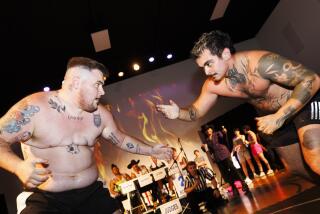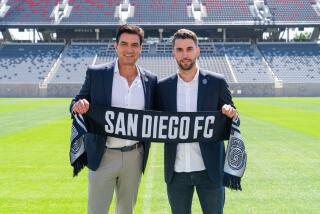Fight league’s hook is to mix it up
- Share via
You spend some time with mixed martial arts fighters, you anticipate the topics to be bruises and blood.
When I sat down with some members of the International Fight League recently, we wound up talking about cooking, hair-dye techniques and world peace.
The thing that hooks people on mixed martial arts is its unpredictability. Maybe that’s why the creators of the IFL think they can also pull off the unexpected: successfully launching a new professional sports league.
Is the time right? On the one hand, a recent major league start-up -- the WNBA -- just lost a charter member when the Charlotte Sting folded Wednesday. On the other, 18- to 34-year-old males, the target of sports TV advertising, are much more likely to watch men fighting than women playing basketball.
And the mixed martial arts world is coming off its biggest night yet: Saturday’s Ultimate Fighting Championship bout between Chuck Liddell and Tito Ortiz did more than $5.3 million in gate receipts at the sold-out MGM Grand Garden Arena and an estimated 1 million pay-per-view buys at $39.95 a pop.
Start-up costs for the IFL could come to $20 million, but co-founders Gareb Shamus and Kurt Otto think they have found a niche. Shamus, a publisher and comic book show producer, handles the business side. Otto, an architect who has a black belt in karate, brought in the fighters. They have a television deal with FSN and signed the William Morris Agency for representation and cross-promotion.
Now the IFL is trying to establish a new front: local affiliation. One of the things NASCAR had to overcome in its popularity surge was a lack of hometown rooting interests. There are no New York Giants or Chicago Bulls to create a natural bond with residents.
The IFL will put teams such as the Los Angeles Anacondas, the Southern California Condors, the San Jose Razorclaws and the Seattle Tiger Sharks in action for a 12-team, 11-date schedule this year. There are two events at the Forum -- on March 17 and the final on Sept. 15.
“You’re not fighting for yourself anymore, you’re fighting for your team,” said Justin Levens, a light heavyweight on the Condors. “It’s kind of cool. I think it’s a great idea. It’s a great concept.”
Each event features four teams in a pair of five-fight matches. There also will be an exhibition “superfight” featuring marquee names -- in some cases the coaches of the teams. Now there’s an idea other sports could use. Wouldn’t you want to see Bill Belichick against Eric Mangini? Phil Jackson and Jeff Van Gundy?
In the IFL’s case, these coaches appear ready for battle. Marco Ruas, the coach of the Condors, looks like a Brazilian Rocky Balboa. Chicago Coach Igor Zinoviev looks like Drago.
Zinoviev will coach an all-Russian team -- the Red Bears -- that will share a house together in Chicago (sounds like a reality series). Zinoviev will make the meals.
“In Russia, when I was young, they sent me to cooking school,” Zinoviev said. “My wife married me because I’m a cook. It’s funny, but it’s true.”
If “the Russian Chef” doesn’t sound so intimidating, try Levens’ nickname: “the Executioner.”
Levens grew up watching boxing and wrestling. He liked Hulk Hogan and Macho Man Randy Savage, and he takes a little bit of the wrestling attitude with him into the ring.
“It’s very character-driven,” Levens said. “You’ve got to sell your name. People have got to recognize you.”
To stand out, he dyes his hair half red and half black.
The hair part is almost as challenging as the training.
“The first time it came out an ugly orange color,” he said.
Now he knows the key to attaining proper coloration: “Bleach that sucker out, man.”
Like many in the sport, Levens still believes it has to overcome negative stereotypes.
“People think it’s like a cockfight,” he said. “What they don’t know, it’s not [idiots] going in there slugging it out. It’s people who have trained for years to learn the techniques, the submissions.”
And while Levens likens the combatants to gladiators, teammate Antoine Jaoude thinks even that term is a misnomer.
“Gladiator was in Rome,” said the Brazilian-born Jaoude. “Finished.”
Jaoude was a freestyle wrestler for Brazil in the 2004 Olympics, and he learned mixed martial arts techniques from Ruas. When he says he likes the mental aspects of the sport as well as the physical, you can believe him; he’s in law school in Brazil and one day hopes to be a United Nations ambassador.
And he doesn’t see a conflict between his current pastime and his future goals.
“The fight’s a fight,” Jaoude said. “It’s professional. Then we bring peace to the world.”
He wants world peace, Shamus and Otto want a successful new league.
Jaoude might have the easier task.
J.A. Adande can be reached at [email protected]. To read more by Adande, go to latimes.com/adandeblog.
More to Read
Go beyond the scoreboard
Get the latest on L.A.'s teams in the daily Sports Report newsletter.
You may occasionally receive promotional content from the Los Angeles Times.










